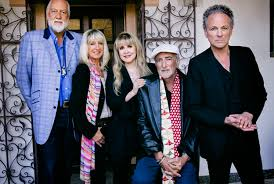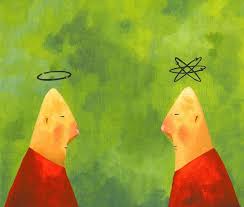
Fleetwood Mac a “religious experience?”
Believe it or not, I recently attended my first “rock” concert. Even though the Fleetwood Mac performers are nearly as old as me, culturally the experience was like a visit to a foreign country. Twenty thousand people, from Millennials to Gen X to Baby Boomers, mouthed the words to Mac’s famous songs, many with their eyes closed as if praying.
Colored strobe lights were continually swinging around the inside of the giant Pepsi Center arena in Denver. For many, there was no need to pay for a seat since they were on their feet for the whole concert. Many were dancing and swaying. What was obvious was that the performers had the audience’s undivided attention for the couple of hours they were onstage.
The whole thing appeared to me to be a sort of religious experience, and I couldn’t help comparing it to “church.” Some of the contemporary mega churches may attempt to mimic concert-like experiences, but most church-goers would see little comparison to what they experience at church and the kind of emotional absorption and sheer joy I witnessed at the concert.
The reality is, of course, that the experiences are, and should be, very different. What people seek in such a concert isn’t what they seek from going to church. In a blog last year, I quoted Rachel Held Evans, a young evangelical Christian who writes a popular blog on faith and gives presentations around the country. In a blog for CNN entitled, “Why Millennials are Leaving the Church,” she wrote:
“Invariably, after I’ve finished my presentation and opened the floor to questions, a pastor raises his hand and says, ‘So what you’re saying is we need hipper worship bands ….’
“Time and again, the assumption among Christian leaders, and evangelical leaders in particular, is that the key to drawing twenty-somethings back to church is simply to make a few style updates – edgier music, more casual services, a coffee shop in the fellowship hall, a pastor who wears skinny jeans, an updated Web site that includes online giving.”
That isn’t what Millennials have in mind, she wrote.
“…We want to be challenged to live lives of holiness, not only when it comes to sex, but also when it comes to living simply, caring for the poor and oppressed, pursuing reconciliation, engaging in creation care and becoming peacemakers. You can’t hand us a latte and then go about business as usual and expect us to stick around. We’re not leaving the church because we don’t find the cool factor there; we’re leaving the church because we don’t find Jesus there.”
This desire isn’t limited to Millennials. “Religion” means to connect, and all searchers for God are looking for a connection to God and, acknowledged or not, to each other.
I’ve written several blogs about the popular notion of “spirituality without religion,” an idea that, given the image of religion today, may be understandable.
To many, religion is the aggregate for a group of institutions, all of which appear to offer “salvation.” In many people’s eyes, however, these institutions are more interested in self-preservation and self-aggrandizement than in actual people with actual lives. Part of the rub is that, like any business or secular organization, they have rules, organizational charts and chains of command, and for some reason, religions aren’t supposed to be so organized.
Some refer to religion as “Pablum.” For those unfamiliar with the term, it’s a kind of baby cereal – something like oatmeal – which Wikipedia says implies something that is “bland, mushy, unappetizing, or infantile.” What’s more, the theology and practices of some religions fly in the face of contemporary notions of fairness and equality. Some appear to offer nothing “original,” or appear to have nothing to offer at all.
Although I understand these observations, I really think part of the problem is – for lack of a better term – cultural. Most of the world’s great religions are ancient, and we’re caught up in the present and “the next big thing.” We can’t get beyond the confines of time and space and we have to contend with so many distractions plus our own lethargy. And the great controversies of our time seem much more important than the historic questions about the existence and nature of the transcendent.
Spirituality may be a good idea, but for many, it remains a vague yearning. We may pursue it in spurts, but a sustained pursuit of a spiritual life on one’s own eludes most people. Without religion, it often becomes more about “me.”
That brings us back to relationships, something humans know a lot about. If you don’t believe in its importance, talk to prisoners who have suffered long periods of solitary confinement. All theist religions boil down to relationships. The charge in the Hebrew Bible, repeated by Jesus in the Christian Bible, to “love God and neighbor,” is not only a universal commandment but a universal human longing.
William O’Malley, a Jesuit priest who teaches religion at Fordham Preparatory School in New York City, wrote in an article in America magazine in which he tried to shed light on what he believes is true spirituality, which depends on religion just as religion depends on it.
“Spirituality is, as Viktor Frankl put it, ‘man’s search for meaning.’ We are the only species whose choices are not branded into the fibers of our natures. We must choose to be who we are. But first we must discern what human beings are for. And we have only two backgrounds against which to measure our worth. Our lives are either speckles of light against infinite darkness or smudges of gray within infinite Light. We are here to discover our shining (see Gospel of Mathew 5:14).
“Liturgies” he goes on, “that make the community as important as its Host miss a crucial truth … we are connected into an Inexhaustible Energy whose infusion ought to make us recognizably more alive the rest of the week than those who ignore Him/Her/Them.”
The Fleetwood Mac audience were wildly enthusiastic, but afterward many piled into their cars, Ubers and taxis to return to lives of self-imposed isolation from God and each other. Spirituality, within the context of religion, makes and preserves the connections that are vital to human beings.






